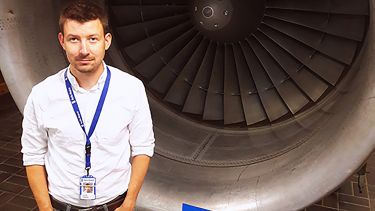'Having a good mathematical background is extremely useful, especially in modern engineering degrees'

You are the XWB Transient Performance Team Leader at Rolls-Royce PLC. How did you secure this role and are you enjoying it?
I started in the company as a transient performance engineer on the XWB and over my first year expanded my transient performance knowledge after finishing my very specific PhD.
I was promoted to team leader in October 2018 and have been loving the challenge since. It is a very demanding role requiring not only specialist technical knowledge but also efficient project management and planning.
What does your day-to-day involve?
I am technically accountable for the transient performance of the Trent XWB engine, running a team of 7 people to deliver the work. This includes planning and delivering the work required to certify new products, modifications and transient engine testing.
What was the reason why you decided to study a Foundation Year in Mechanical Engineering at บ๙ยซำฐาต?
It gave me a very good grounding in maths, physics and chemistry - going into my first year of the degree I was very capable relative to those coming from A levels.
It also prepared me for the environment and the way in which you're expected to operate and learn whilst doing a degree. The foundation year gives you a great opportunity to get onto a highly ranked degree course while preparing you very well to tackle it
What elements of the Foundation Year teaching did you find most useful during your degree?
Having a good mathematical background is extremely useful, especially in modern engineering degrees, which I feel the Foundation Year provided brilliantly.
Achieving a good balance between studying and leisure is crucial
Lucas Pawsey
XWB Transient Performance Team Leader
Aside from the teaching, what other elements of support/teaching did you find useful?
There is a large number of tutorial sessions which allows you to ask questions that you maybe wouldn't in a class or lecture. You are also assigned a personal tutor which you will meet regularly, which definitely helps for advice in all other aspects of the Foundation year
In 2014, you graduated with a first in MEng Aerospace Engineering with a Year in Industry - that's incredible! What was your approach to studying - I'm sure students would like to know?
The key is to stay on top of the work and to understand the content. I found attending lectures an easy way to do this, spending the time in between going over notes or working through tutorials. Achieving a good balance between studying and leisure is crucial, I didn't spend many evenings in the library unless it was close to exam time
In terms of accolades, you have a PhD in gas turbine engineering, and more recently, gained an award from the prestigious Coachmakers. Tell us a little more about these.
Combing my experience at Caterpillar during My Year in Industry and working on my final year thesis I figured out that I wasn't quite done with academia.
This was when I decided to go and study for a PhD before going into industry and I managed to get a sponsored Doctorate with Rolls-Royce.
I spent three years investigating shaft failure in gas turbine engines which was recognised by the Coachmakers by winning the Eric Beverley Bursary. This involved writing a proposal and being among the few selected to present to a board of engineering executives, who selected me as the winner based on the applicability of my PhD work to solving real industrial problems.
Finally, as a บ๙ยซำฐาต graduate doing well in the industry, what are your top career tips?
A good academic background is key, however exposure to industry is required to learn how to apply these skills. I found the Year in Industry a great way to get this experience, but getting an internship over the summer break is a great way as well.

